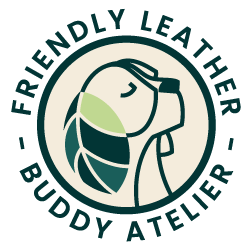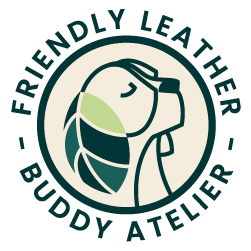Our Top 4 Vegan Leathers: Everything You Need to Know About Their Benefits and Drawbacks
With its roots in the 1960s, vegan leather is a textile made to resemble leather in its appearance, aesthetic, and durability. The first vegan leathers were made from PVC and polyurethane - two materials that are still widely used in the production of vegan leather today. However, as consumer demand for sustainable and eco-friendly products has increased, so has the range of vegan leathers available on the market. There are now a variety of different vegan leathers made from plant-based materials such as cactus, pineapple leaf fibers, and even mushrooms. Each has its own set of unique benefits and drawbacks, which we will explore in this article.
We'll delve into the top 4 vegan materials we use to create our range of premium vegan leather products. We're keeping 100% real and giving you the pros and cons of each vegan material so that you can make an informed choice about which one is right for you.
What is Vegan Leather, and Why is it Important?
Before we get into the different types of vegan leather, let's take a step back and answer the question: what is vegan leather? As the name suggests, vegan leather is a material that looks and feels like leather but is made without animal products. This makes it an ideal choice for those who want to enjoy the look and feel of leather without contributing to the animal agriculture industry.
In addition to being vegan-friendly, vegan leather also has a number of other benefits. It is often more affordable than traditional leather, as it does not require the same level of processing. Vegan leather is generally more durable than its natural counterpart, as it is not as susceptible to drying out and cracking. And, because it is not made from animal products, vegan leather does not contribute to the global issue of animal exploitation.

Now that we know what vegan leather is and why it matters, let's take a closer look at the four vegan materials we use to create Buddy Atelier's premium collection of accessories.
Organic Cactus Leather
Organic cactus leather is one of the newest vegan leathers on the market. The cactus is sustainably harvested and then processed to extract its fibers, which are used to create a textile that resembles leather. At Buddy Atelier, we use a USDA-certified cactus leather brand, Desserto, which primarily focuses on nopal (Opuntia ficus-indica) - a type of cactus that is native to Mexico. Nopal is an incredibly resilient plant and can survive in arid conditions with very little water. This means that it can grow in areas that are not suitable for other crops without having to use pesticides or herbicides, restoring the land and preventing desertification.
Cactus leather is waterproof, breathable, and has high abrasion resistance. It is incredibly eco-friendly, as it requires very little water or energy to produce and relieves the accumulation of Carbon dioxide in the atmosphere. One of the only drawbacks of cactus leather is that it is not as flexible as some other vegan leathers, so it may not be suitable for certain types of products. Desserto is also not fully biodegradable as the final product contains polyurethane, which microorganisms cannot break down.
Pineapple Leather
Pineapple leather, also known as Piñatex, developed by Ananas Anam, is a vegan leather made from the waste fibers of pineapple leaves. The pineapple leaves are sustainably harvested in the Philippines and then processed to extract the long, strong fibers used to create a textile that resembles leather. The leftover fibers from this process are then used as natural fertilizer or bio-fuel, making pineapple leather a truly zero-waste product.
Pineapple leather is a strong, breathable, and flexible vegan material, making it suitable for a wide range of products. It is also eco-friendly, requiring very little water or energy to produce. And, because it is made from a waste product, pineapple leather has a low carbon footprint. However, pineapple leather is not as durable as some other vegan leathers, so it may not be suitable for products that see a lot of wear and tear. Piñatex finished products also contain polyurethane, which means they are also not fully biodegradable, although the non-woven mesh is biodegradable.
Mushroom Leather
Mushroom leather is a vegan leather made from the roots of mushrooms. The process begins by growing the mushrooms on a substrate of agricultural waste, and the process is entirely carbon neutral. Once the mushrooms have reached maturity, they are harvested, and the roots are processed to extract fibers that can be used to create a textile. At Buddy Atelier, we use Life Materials' MuSkin mushroom leather, made from Phellinus ellipsoideus - a bracket fungi native to China.
Mushroom leather has many benefits - the production process is entirely free of toxins and chemicals, the vegan material is usually soft and supple like animal leather with a suede-like finish, and it is breathable with the capacity to become waterproofed when treated. Depending on how the mushroom leather is treated, it does have the ability to be biodegradable. In terms of durability, however, mushroom leather is not as strong as some of the other vegan leathers on this list, so it may not be suitable for products that will see a lot of wear and tear. Life Materials recommends laminating or coupling MuSkin with other backing materials to increase its durability and longevity.
MIRUM®
Buddy Atelier stays ahead of the curve by using some of the most cutting-edge vegan leathers on the market, including MIRUM®, produced by NFW. MIRUM® is a bio-based vegan leather made purely from plants and minerals. The vegan material is completely polyurethane and PVC free and is USDA certified 100% bio-based material. This means that MIRUM® is not only environmentally friendly but also compostable without polluting the environment. The material is designed to be robust and durable, as well as water resistant.
MIRUM® requires very little energy and resources to produce and requires no water during manufacturing, giving this vegan leather an extremely low carbon footprint. It is 100% natural and can be recycled limitlessly into new MIRUM® products at the end of its lifecycle, making it the poster child for a circular economy. It is not, however, biodegradable, although MIRUM® does make a good point that the current regulatory standards would deem that even a tree doesn't break down fast enough to meet the regulations in place.
Looking to the Future
As we continue to take steps to ensure that we remain at the forefront of sustainable fashion, we will continue to explore new vegan leathers and vegan materials that have a low impact on the environment. Two such materials are Mylo - the mushroom leather that pioneered the way for mycelium-based vegan leather, and Reishi by MycoWorks - a fine leather alternative made using MycoWorks' proprietary Fine Mycelium technology.
While every vegan leather has its unique benefits and drawbacks, we believe that the future of fashion lies in sustainable, environmentally friendly materials that put the well-being of both people and the planet first. We will continue to explore new vegan leathers and materials as they come onto the market, and we hope you'll join us on this journey!
What is your favorite vegan leather? Let us know in the comments below, and make sure you visit our catalogue of premium plant-based vegan leather accessories to find your perfect fit!


Leave a comment
This site is protected by hCaptcha and the hCaptcha Privacy Policy and Terms of Service apply.